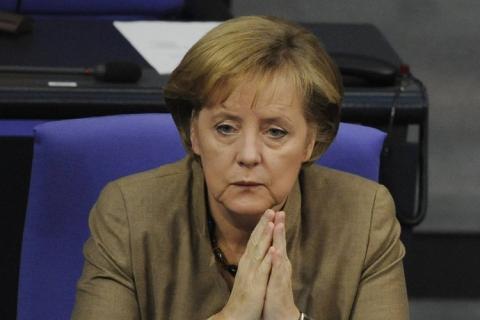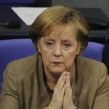
Chancellor Merkel Says Nein to Nabucco
Publication: Eurasia Daily Monitor Volume: 6 Issue: 45
By:

Shifting gears from an ostensible equidistance between pipeline projects, German Chancellor Angela Merkel has come out against proposals to use European Union funds to kick-start the Nabucco pipeline project for bringing Caspian gas to Europe.
Although Germany was never interested in this project in a national capacity and prioritized bilateral arrangements with Russia over the imperatives of EU common energy security, Berlin had not opposed Nabucco. Germany has, however, moved against EU financing of this project in the wake of the January 26 and 27 high-level meeting in Budapest, where the European Commission and EU-funded lending institutions for the first time announced serious plans to support Nabucco (see EDM, January 29, 30).
Merkel announced her opposition to this plan during the European Union’s informal summit of heads of state and governments on March 1 in Brussels. The summit discussed EU funding in 2009 and 2010 for a wide range of energy security projects and anti-crisis stimulus measures, in the context of a €5 billion ($6.3 billion) package soon to be finalized. Under the existing proposals, the EU’s new member countries would end up badly short-changed. Although these countries face the most severe challenges to their energy security, and some (including Nabucco participant countries) are hardest hit by the financial crisis, the EU’s Central-East European countries would only receive a disproportionately small portion of the package. Conversely, certain West European countries would receive disproportionately large portions, including funding for some projects that are not directly related to either EU energy security or anti-crisis stimulus.
The EU Commission had managed in January (after difficult political bargaining in Brussels) to set aside € 250 million ($316 million) for construction of the Nabucco pipeline. Although paltry when compared with the project’s estimated cost is €8 billion ($10 billion), this start-up credit could at least help kick-start the project and boost the confidence of other possible investors. Even this small amount would come from the EU’s unspent agriculture-support funds, which would normally be returned to national governments. Thus, Nabucco funding to the extent proposed would not place additional burdens on the EU budget (New Europe, March 1-7).
Following the January summit in Budapest, Nabucco participant countries sought to have that start-up credit (and any possible subsequent funding) separated from the overall €5 billion package, knowing that "new" member countries could hardly compete with the EU’s "old" members’ lobbying for funds from that package. The summit just held in Brussels, however, placed the Nabucco funds in the overall pot; and Merkel proceeded to block EU funding for the Nabucco project.
Merkel offered the following arguments at the concluding press conference: 1) "There is no need whatsoever for this [EU financial support for Nabucco]. There are enough private [lending] offers for it." 2) "Nabucco’s problem is where the gas would come from—not an insufficiency of investment funds." 3) Nabucco funding can not qualify for the 2009-2010 anti-crisis stimulus package because, in Merkel’s view, Nabucco’s construction would not fit within that time frame; 4) Germany already contributes a large share of EU budget funds (German Government press release: Chancellor Merkel Press Conference, March 1; EurActiv, March 3).
These arguments are factually inaccurate, however, with regard to this project. Private lending offers for Nabucco are actually lacking, all the more during the present financial crisis and not least due to the absence of seed money from the EU to boost private-sector confidence in the project. Gas for the pipeline’s first phase is actually ensured thanks to Azerbaijan; and there are also short-to-medium-term offers from Iraq and Egypt, as these countries pledged at the Budapest summit. (These prospects could disappear, however, if further delays on Nabucco would force Azerbaijan and, in the second phase, Turkmenistan to sell the available volumes to Germany’s privileged partner, Russia). Nabucco’s construction start would be pushed beyond 2010 (by Merkel’s potentially self-fulfilling prophecy) only if the anti-crisis stimulus funding for Nabucco is denied now (at Merkel’s suggestion). And while Germany, with the single largest economy, is indeed the single largest contributor to the EU budget (complaining about this plays well in the current election year), the EU has after all defined Nabucco as a top priority project within a top priority policy, that for EU energy security.
Not for the first time, such arguments cast doubt on the quality of advice on a range of issues beyond energy that is available to the Chancellor with regard to policy on Europe’s East.
Merkel has shifted tactical gears with this nein to Nabucco. Barely five weeks before she had written to European Commission president Jose Manuel Barroso and the EU’s incumbent Czech presidency, urging EU support for three projects simultaneously: Gazprom’s Nord Stream, Gazprom’s South Stream, and Nabucco. Merkel’s toughly-worded confidential letter found its way to the press (Financial Times Deutschland, January 29; Le Monde, February 3; see EDM, February 4). Concerned at the EU’s move to single out Nabucco for support, Merkel’s letter sought to elevate Nord Stream (of interest to Germany) and South Stream (lobbied by Gazprom and Italy) to an equal footing with Nabucco in terms of EU support.
The European Commission, however, takes the position that Nord Stream and South Stream are business projects whereas Nabucco is a strategic priority of the EU. Since Berlin could not elevate Nord Stream and South Stream to the same level as Nabucco in EU policy, Merkel’s shift of gears seems designed to downgrade Nabucco to the same level as Gazprom’s two projects, which do not qualify for EU support.




